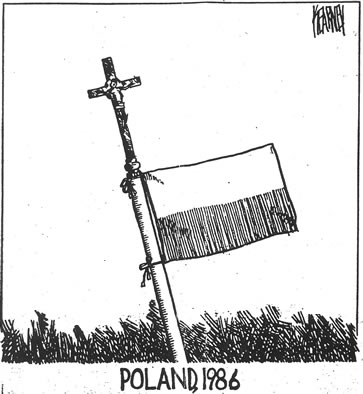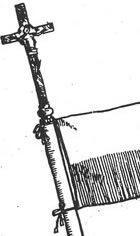POLAND - Selected Works
Pacific News Service, September 1986.
Church Power in Poland is More Political than Moral
The popular view from afar is that Poland's Catholic church is a force to be reckoned with because her 20 million children believe her teachings so fervently and obey her dictates so faithfully.
The reality up close is something quite different. Poles seem to respect their church less as a moralizing mother and more as a muscular political force that takes its lead from its members.
The Polish Church speaks against divorce, yet official statistics show the rate is high; it preaches against the abuse of alcohol, yet Poles are among the world's leading consumers of vodka, and alcoholism is rampant; the Church denounces premarital sex and abortion, yet by the acknowledgement of Church documents and officials, both are common.
According to official statistics include only those abortions performed in state hospitals. Many more go unreported, and some knowledgeable Poles guess that the official number accounts for only one-third of those carried out. This would be more than the annual number of live births.
The Church has carried out aggressive anti-abortion and anti-birth-control campaigns in recent years. Even so, in a country in which most other forms of birth control are difficult to obtain and in which thousands of young people live in cramped quarters with no immediate hope of obtaining their own apartments; many women have abortions out of economic necessity.
Such tension between church teachings and reality produces stress and guilt in many. As one friend put it, "out of necessity many people do what the Church teaches against, but no one is proud of it."
Another layperson prominent in the local church said, "Many Poles are deeply religious, but that doesn't 'mean they follow Church policies."
Politically; however, the Church is the institution that can claim far and away the most widespread allegiance in postwar Poland.
During the popeís historic visit to Poland in June of 1983, police officials ordered crowds congregating outside his private quarters to disperse. Their commands were ignored, and they were forced to give up and turn the matter over to Church officials. A priest stood before the throng and uttered one sentence: "We request that the crowd please disperse." The crowd yielded without protest.

It is true that in recent times of economic crisis the Church has distributed relief items to thousands. It is also true that the Church organized a wide system of aid to help detainees and their families. It has sponsored programs by actors and exhibits by artists, which, in many cases, were veiled protests against martial law or government policies and could not have been staged elsewhere, except illegally and for a much smaller audience. The Church aids some people who are in political trouble, sponsors cultural activities and provides forums for some to meet.
But the Church is not the dominant force, the social center in Poles' lives, that many accounts would have us believe. It is not the first place Poles go when in need. Instead, they are likely to turn to their families, the strongest, most basic unit in Polish society.
One acquaintance said, "The Church would help me out if I were put in jail, but my relatives would help me out first anyway" another, who attends mass only on special occasions, said, "I never tried relying on the Church. I wouldn'tít go to them. I heard the Church helps people they know, more or less."
Perhaps the main reason the Church is revered by the populace, 95 percent of whom are Catholic, is that it is the only institution capable of challenging the government. One example will help explain:
In 1984 the Church declared August was to be one of prohibition. As part of the Church's fight against alcoholism, people were not supposed to drink or purchase alcoholic beverages for the month. But during this month, state stores were stocked with fancy liquors, champagne and other specialty alcohols, which for years had not been available in such abundant supply.
People said that the government thereby hoped to prove the Church a failure. One friend who liked to drink was upset by the government's tactics and resolved to "follow the Church." He simply arranged his vacation in West Germany, where drinking had no such politically charged overtones.


